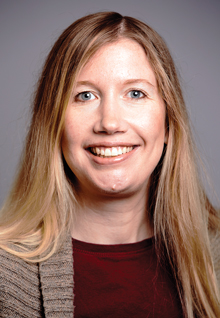Search engines are good at retrieving information. But they can’t assess its value, explore connections or contradictions, or incorporate findings into a larger task—that’s up to the person conducting the search.

Jaime Teevan is working to change that. As a principal researcher at Microsoft Research, she’s already helped add personalized search to the Bing search engine. The work drew on work with Professor David Karger, her Course 6 master’s and PhD advisor, and resulted in her being named a 2009 Technology Review TR35 Young Innovator. Last year she received the Borg Early Career Award from the Computing Research Association’s Committee on the Status of Women in Computing Research.
Teevan’s current focus is “slow search.” Search engines, she explains, prioritize speed, because user studies have consistently found that rapid search results are perceived as being of higher quality. “But that requires sacrifices,” she says. “Now we’re looking at providing better experiences by taking more time—so a search engine can respond to more complex questions and deliver more relevant content.” She compares slow search to posing a query in an online forum, where people happily wait hours or days for answers; complex tasks often involve multiple sessions, and the search engine could use the time between sessions to analyze or refine results.
Teevan says slow searchengines could also be more helpful in the complex processes people already do—analyzing a business opportunity, responding to a newly diagnosed medical condition, or assessing a home repair project.
“Every book about how to be productive advises breaking complex tasks like search tasks into pieces, making action plans with concrete steps, doing the most manageable ones first,” she notes. “We’ve all been expected to do that task management ourselves, but what if you could algorithmically support the breakdown into small steps that only take a few seconds each? We’re exploring what it means to break something down into micro-tasks that could be done while waiting in line or during a break in your kid’s baseball game.”
The prospect of utilizing random snippets of time might be especially appealing to Teevan and her husband, Alexander Hehmeyer, a senior program manager at Skype, whom she met while earning her bachelor’s degree in computer science at Yale. The two are parents of “four awesome little boys” between the ages of seven and 11. “Being with them is what I do for fun,” she says.
Keep Reading
Most Popular
Large language models can do jaw-dropping things. But nobody knows exactly why.
And that's a problem. Figuring it out is one of the biggest scientific puzzles of our time and a crucial step towards controlling more powerful future models.
The problem with plug-in hybrids? Their drivers.
Plug-in hybrids are often sold as a transition to EVs, but new data from Europe shows we’re still underestimating the emissions they produce.
Google DeepMind’s new generative model makes Super Mario–like games from scratch
Genie learns how to control games by watching hours and hours of video. It could help train next-gen robots too.
How scientists traced a mysterious covid case back to six toilets
When wastewater surveillance turns into a hunt for a single infected individual, the ethics get tricky.
Stay connected
Get the latest updates from
MIT Technology Review
Discover special offers, top stories, upcoming events, and more.